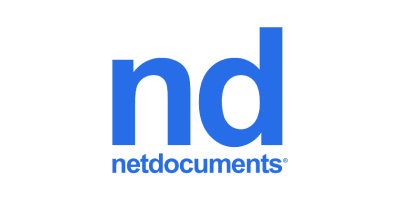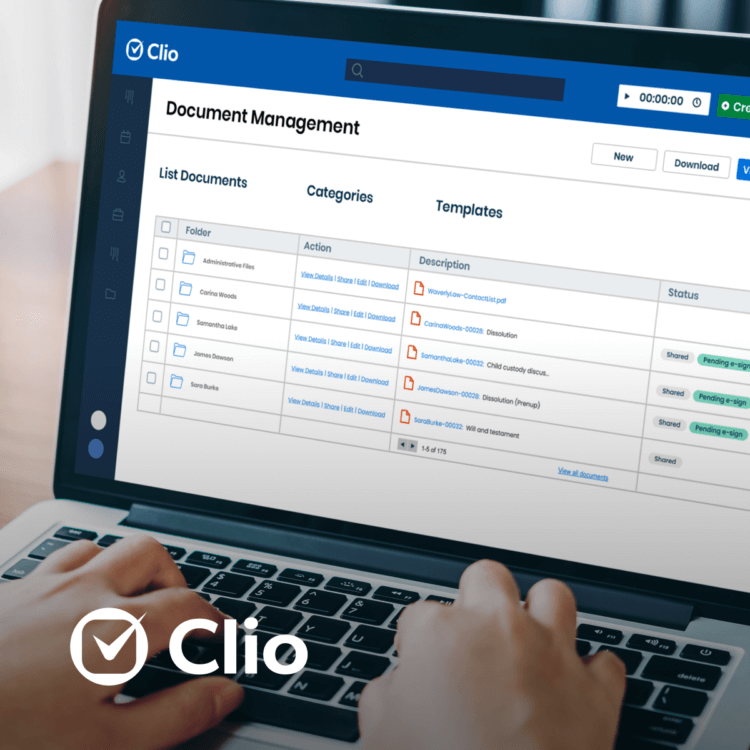As a lawyer, you’re constantly inundated with mountains of critical documents—contracts, leases, letters, notices, and more. Managing it all can quickly become overwhelming. You may lose precious billable hours scouring for information, or struggle to keep track of the latest version of files.
It’s no surprise many lawyers grapple with legal document management. Thankfully, legal document management software for law firms. Read on to learn about the best software and consider which is suitable for you and your firm.
As you set out to drive efficiency and increase revenue this year, you’d be remiss to skip our list of the best legal document management software programs. Read on to learn about the best software and consider which is suitable for you and your firm.
Clio’s legal document management system includes unlimited document storage, advanced document search, e-signatures, and more. Book a demo to see it in action.
What is legal document management software?

A legal document management system (DMS) allows lawyers to store, organize, and access documents from one central repository. These solutions empower lawyers to work more collaboratively and efficiently—no matter where they are. Legal document management software also enhance the security of client documents by preventing unauthorized access.
How legal document management software helps law firms
A growing number of legal professionals are already working smarter through the power of legal document management software. The 2023 ABA Legal Technology Survey Report found that 89% of respondents expressed satisfaction with their document and records management software, highlighting its importance in legal practice.
To fully grasp the benefits of legal document management software for lawyers, consider the pain points law firms face without it. These challenges include:
- Wasting time locating critical files in paper-based or disorganized systems.
- Risk of copy-and-paste errors from manually creating documents.
- Uncertainty over whether they’re working on the latest version of a document.
Legal document management software solves these issues. Features like automated version tracking, advanced search capabilities, and secure cloud storage transform document workflows.
Why are legal document management systems essential for lawyers?
Legal professionals manage an overwhelming volume of documents, from contracts and pleadings to discovery materials and client communications. Without a reliable legal document management software system, firms risk misplacing important files, failing to comply with regulations, or spending too much time on manual tasks like document retrieval or version control.
A DMS for lawyers can:
- Retrieve documents quickly from anywhere and on any device. Lawyers can, for example, easily pull up documents in a courthouse—rather than having to lug around physical copies of case files.
- Locate information instantly through advanced search functionality, instead of manually sifting through stacks of paper.
- Save time and reduce the likelihood of error by automatically generating letters and other documents based on standard templates.
- Collaborate seamlessly by viewing and updating documents in real-time. Each document’s version history also shows who made changes and when.
- Work smarter with document automation, which saves time and leaves more hours to be allocated for client work.
The list of benefits keeps going. The bottom line, though, is that legal document management systems transform how law firms handle information. As Clio’s latest Legal Trends Report found that lawyers only complete 2.9 hours of billable work per day, firms can benefit from gaining more time to focus on client needs.
Types of legal document management systems
Law firms handle a vast amount of sensitive information, making it essential to choose the right document management system (DMS). Here are the main types:
1. Cloud-based document management systems
Hosted on secure cloud servers, these systems provide remote access, automatic backups, and enhanced security. They are ideal for firms with remote teams or those seeking scalable, hassle-free solutions.
Example: NetDocuments, iManage Cloud.
2. On-premises document management systems
Installed on a law firm’s own servers, these systems offer complete control over data security and compliance. They work best for firms with strict data privacy requirements or IT teams managing internal infrastructure.
Example: Worldox, iManage Work.
3. Hybrid document management systems
These solutions combine on-premises and cloud storage, allowing firms to keep sensitive files in-house while leveraging cloud accessibility. They provide flexibility while maintaining regulatory compliance.
Example: iManage Hybrid.
4. Case management systems with document management
These systems integrate document storage with case tracking, calendaring, and billing, making them ideal for solo practitioners and small firms needing an all-in-one solution.
Example: Clio, MyCase.
You may like these posts
The best legal document management software for law firms
Lawyers have plenty of options when it comes to legal document management software. So, where do you start? We’ve outlined several software solutions that are leading the way in legal document management.
Clio

Clio introduced the first cloud-based practice management software to law firms in 2008—and continues to be at the forefront of legal tech innovation. It’s widely considered to be the top legal document management solution, with high ratings on G2 Crowd, SoftwareAdvice.com, Capterra, and Lawyerist (read more reviews here).
Clio is trusted by over 150,000 legal professionals who have found its legal document management software especially powerful in their firms.
Pros
- Infinite document storage: Clio lets users save an unlimited number of documents, image, audio, and video files and automatically backs them up to the cloud.
- Simplified search: Need to find information right away? No problem. With Clio’s Global Search functionality, users can retrieve it in seconds based on terms in the title, text, or metadata. Files can also be sorted by authors, dates, custom categories, and more.
- Automated templates: Clio’s easy-to-use templates reduce the time spent drafting legal documents. It also automatically populates contact and matter information into documents, saving time on manual data entry.
- Electronic signatures: Clio users can wave goodbye to downloading, printing, and scanning a document when a signature is needed. With its e-signing capability, users can simply prepare and send out documents for signature by email and have signed documents automatically saved in the system.
- Artificial intelligence capabilities: Clio’s generative AI legal technology summarizes legal complex documents, extracts key details and dates from court documents, and more—ensuring you operate at peak efficiency.
- Access documents anywhere, anytime: Rather than relying on in-house servers, Clio’s legal document management software stores files securely in the cloud. This means you can access information from anywhere—all you need is an internet connection.
- Stringent security measures: Lawyers can rest assured that their documents are stored and backed up securely. Permissions controls also let users determine who can view and edit documents in your system.
- Easily track changes: Stay on top of document changes with a full version history and running comment thread for each file. This means that you’ll know exactly who to go to if you have a question.
- Built-in e-filing: With Clio File, lawyers can file and serve court documents directly from their case in Clio.
- Tailored options for personal injury firms: Clio includes an optional suite of features for law firms practicing personal injury, including features that help manage medical records, track and summarize damages, and provide settlement estimates.
Cons
- Some features and integrations are only available in certain countries or regions.
NetDocuments

NetDocuments is a cloud-based document management system for law firms, legal departments, and other professional service organizations.
Pros
- Cloud-based availability: Fully cloud-based, offering users access to their documents from anywhere with an internet connection.
- Top-tier security: Features customizable user access controls, allowing firms to manage who can view or edit specific documents.
- Scalable: Can grow with a firm’s needs without sacrificing performance or increasing complexity.
- Third-party integrations: Integrates with a wide range of third-party tools and programs, including Clio.
Cons
- Customization limitations: Offers a standardized platform with less customization flexibility compared to some competitors.
- Limited built-in practice management features: Primarily focused on document management, meaning it lacks built-in practice management features like time tracking, billing, and case management.
Smokeball

Headquartered in Sydney and Chicago, Smokeball is a hybrid desktop and cloud-based legal document management software solution for solo and small law firms.
Pros
- Legal document automation: Smokeball lets users create custom templates of their most-used files. It automatically populates information, such as case numbers and contact details.
- Unlimited cloud backup storage: Users gain peace of mind in knowing that their files are securely stored.
Cons
- Not a true cloud-based program: As a hybrid desktop and cloud-based software, Smokeball uses desktop software with a cloud-based backend. As a result, it doesn’t provide all of the benefits of a 100% cloud-based system, and it still requires a somewhat high-powered Windows device to run.
- Less than ideal user experience: Smokeball’s hybrid infrastructure and lack of document management integrations make it difficult to access and edit documents via the cloud.
LexWorkplace

LexWorkplace is a legal-centric, cloud-based document and email management software, that integrates directly with Clio. It enables law firms to organize documents and email by client and matter, and provides robust DMS tools including full-text search, document tagging and profiling, version management, unique document IDs, and more.
Pros
- Made for law firms: It organizes documents and emails by client and matter.
- Integrates with Clio: Pull matters directly from Clio Manage into LexWorkplace, eliminating duplicate entries and keeping matter data uniform.
- Works on Mac and PC: LexWorkplace works natively on Windows and Mac computers.
- Full-text search: Search across millions of documents and emails in seconds. Search by client, matter, document type, tags, and more.
- No outside consultant required: Unlike other document management products, the team at LexWorkplace will handle implementation, data migration and training, with no third-party reseller required.
Cons
- Not designed for solos: LexWorkplace’s scope and price may make it unsuitable for solo/one-person law practices.
- No open API: At present, LexWorkplace does not offer an open API for third-party software developers.
- No reseller program: There’s no program by which third-party consultants can resell and implement LexWorkplace. All sales and onboarding are done by the LexWorkplace team.
ProLaw

ProLaw is an all-in-one legal practice management software that combines case and matter management, document management, and accounting features. Developed by Thomson Reuters, it’s designed for law firms of various sizes seeking a comprehensive solution for managing their operations.
Pros
- Comprehensive solution: Offers an integrated suite that includes case and matter management, document management, billing, accounting, and reporting
- Integration with Microsoft Office: Integrates seamlessly with Microsoft Office
- Customizable workflow: Allows for the customization of workflows to fit the needs of different practice areas or departments within a firm
- Accounting and financial management: Includes a built-in accounting system that handles trust accounting, billing, time tracking, and financial reporting
Cons
- Limited cloud options: The 2024 Legal Trends Report for Mid-Sized Law Firms found that 59% of mid-sized firms use cloud-based LPM software, compared to 78% of smaller firms and 76% of firms, generally. ProLaw’s cloud offerings aren’t as robust as those of some other competitors, such as Clio.
- Complex setup and maintenance: The initial setup and configuration can be complicated, and ongoing maintenance and system updates may require dedicated IT support.
- Outdated user interface: Some users report that the user interface feels outdated compared to newer, more modern legal software solutions.
- Performance issues with large data sets: It can experience performance slowdowns when dealing with very large databases.
iManage

Known for its AI-powered document and email management, iManage allows legal professionals to organize, secure, and access documents easily. Its standout feature is its ability to automatically classify documents and emails based on content, improving efficiency.
Pros
- Integrates with Clio: Eliminates the need to switch tools and reduces the risk of version control issues through integration with Clio
- AI-powered document management: Incorporates AI-driven technology to automate document classification, metadata tagging, and search functionality
- Security and compliance: Provides advanced encryption, access controls, and audit trails
- Integration with Microsoft Office: Integrates directly with Microsoft Office programs, enabling users to manage documents and emails within familiar applications
- Scalability: Suitable for law firms and legal departments of all sizes with a highly customizable platform
Cons
- Steep learning curve: The system’s advanced features and customization options can overwhelm users without proper training.
- Performance issues with large data sets: Some users report that the program can experience performance lags when handling vast document repositories, mainly when using its search functions or running more complex queries.
- Limited customization for smaller firms: The platform is often tailored toward large firms with complex needs, with smaller firms finding that the available features are too extensive or cumbersome for their specific needs.
Features to look for in legal document management software
When choosing legal document management software, there are several essential features that you should consider. A robust document management software program can significantly improve efficiency, security, and compliance in handling legal documents. Here are the key features to look for:
Centralized document storage
A well-organized repository where all documents are stored in one place, such as Clio Drive, is crucial. This feature allows users to easily search, retrieve, and manage documents without worrying about duplicates or misplaced files.
Why it matters: It ensures that everyone in the firm can easily access the latest versions of documents, reducing the chances of errors and missing information.
Advanced search capabilities
The ability to perform full-text searches across all documents can save significant time. Look for software that supports tagging, keyword search, and filters to find documents quickly.
Why it matters: Legal professionals deal with vast amounts of documents. Efficient search tools help reduce time spent on manual document retrieval.
Version control and document tracking
Version control helps maintain a clear record of document edits, updates, and revisions. This feature ensures that previous versions can be easily accessed and compared, providing a clear audit trail.
Why it matters: It prevents confusion over multiple versions of a document and ensures the most up-to-date file is always available.
Security and compliance
Security features such as encryption, user access controls, and audit trails are critical in protecting sensitive legal information. Legal document management software should also be compliant with legal industry regulations.
Why it matters: Legal documents often contain sensitive client information, so robust security features are essential to prevent data breaches or unauthorized access.
Document sharing and collaboration
Collaboration tools that allow legal teams to securely share, comment on, and edit documents in real-time are crucial. Some software may also offer secure client portals for sharing documents with clients or external parties.
Why it matters: It ensures that teams can collaborate efficiently without risking data security, especially when dealing with clients or external counsel.
Integration with other legal software
The software should integrate seamlessly with other tools your law firm uses, such as case management systems, billing software, and email platforms.
Why it matters: Integrations allow for smoother workflows, reducing the need to switch between different platforms and tools manually.
Document automation
Document automation features allow users to create standardized templates for frequently used documents, such as contracts or legal forms. The software can auto-fill these templates using data from other systems, reducing the time spent on manual document creation.
Why it matters: Automating routine document creation saves time and reduces the risk of errors, allowing legal professionals to focus on more strategic tasks.
Mobile access
With remote work becoming more common, mobile access is increasingly important. Legal document management software should offer mobile apps or web-based platforms that allow lawyers to access and manage documents on the go.
Why it matters: Mobile access ensures that legal professionals can review and manage documents from anywhere, improving overall flexibility and responsiveness.
Workflow automation
The software should allow for the automation of routine tasks, such as document approval processes, deadline tracking, or client notifications. Automation helps standardize workflows and ensures that critical tasks are completed on time.
Why it matters: It improves productivity by automating repetitive tasks and ensuring that critical deadlines are met consistently.
Data backup and disaster recovery
Having a secure, automatic backup system ensures that documents aren’t lost due to technical issues, cyberattacks, or accidental deletions. Disaster recovery features help firms quickly restore data after a breach or system failure.
Why it matters: Document loss can be catastrophic in the legal industry. Regular backups and disaster recovery tools ensure that all data remains safe and accessible.
Choosing the right legal document management software
The best legal document management software for your firm depends on your specific needs, including the size of your firm, your document storage requirements, and your need for integrations with other tools. Investing in the right legal document management software isn’t just about staying organized—it’s about boosting efficiency, ensuring compliance, and future-proofing your firm’s document management processes.
What’s next?
As technology continues to advance, keep an eye on trends like AI-driven automation, cloud security enhancements, and deeper software integrations. These will be key in shaping the next generation of legal document management systems. Stay ahead by choosing a platform that is adaptable, secure, and designed for the future.
Final thoughts on the best legal document management software

Although a multitude of options exist, not all legal document management software systems are equal. To fully realize the benefits, be sure to look for an all-in-one solution that offers features like unlimited document storage, permission controls, advanced search functionality, document automation, and electronic signatures. As the leader in legal technology, Clio provides all that and plenty more.
Clio’s legal document management system includes unlimited document storage, advanced document search, e-signatures, and more. Book a demo to see it in action.
We published this blog post in January 2023. Last updated: .
Categorized in: Business
Learn how to use tools (like MS Word) to simplify document drafting
Are you ready to make legal document drafting easier? Learn top MS Word tips and tricks, plus how document automation tools can handle the heavy lifting for you.
Watch now








